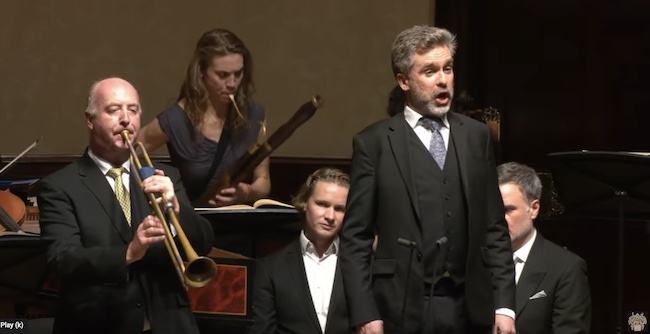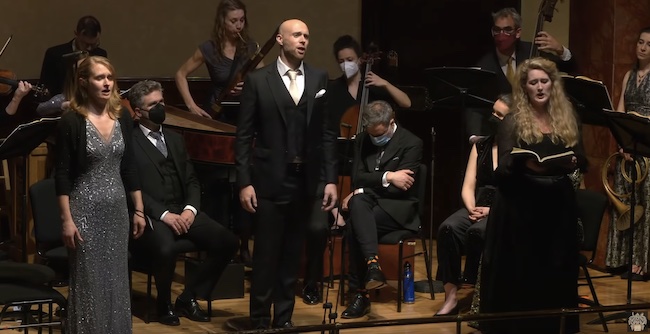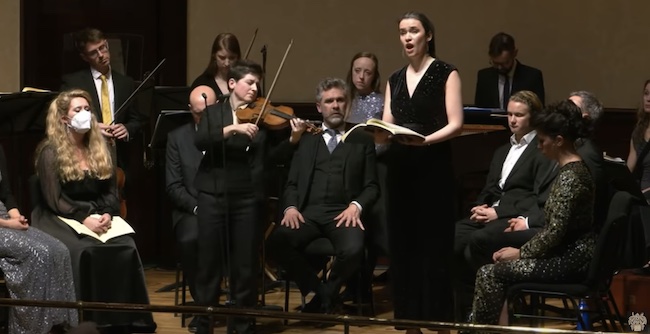Solomon's Knot, Wigmore Hall review - festive music for uncertain times | reviews, news & interviews
Solomon's Knot, Wigmore Hall review - festive music for uncertain times
Solomon's Knot, Wigmore Hall review - festive music for uncertain times
Bach’s Christmas Oratorio offers joy and revelation in an uplifting performance

It had been a tense week, explained Jonathan Sells, the artistic director and bass-baritone of Solomon’s Knot, from the stage of the Wigmore Hall: unsure if the concert would go ahead, unsure who exactly would be able to perform, unsure if there would be anyone in the audience.
In the event it did go ahead, there was an audience present (although I was watching the livestream) and the hastily revised cast cramming the stage gave a joyful and uplifting account of Bach’s Christmas Oratorio that was a triumph in the circumstances.
Solomon’s Knot’s credo is “to blow the dust off early music” and “never to lose the joy of performing”. They all certainly looked happy to be there, even if the future for performing musicians is suddenly very uncertain. The band are period instrument specialists without a conductor and the singers perform from memory – although there is no complaint that the late stand-ins Hilary Cronin and Helen Charlston carried music. The eight voices and 21 instruments captured the festive tone of the music, ranging from the grandeur of the opening to the interior monologue of cantata IV, with a spry and precise energy. The programme was four of the six cantatas that make up the Christmas Oratorio. The glorious opening featured crisp vocal consonants pushed along by the punchy timpani (Rosemary Toll), and Neil Brough’s natural trumpet solo (pictured above) was thrillingly virtuosic. The pastoral second cantata featured an athletic aria by tenor Ruairi Bowen, but it was the recitatives that impressed throughout: Bowen and Alex Ashworth in particular offering gripping and committed storytelling. Kate Symonds-Joy’s aria "Schlafe mein Liebster, genieße der Ruh" was sweet-toned and complemented by elegantly shaped oboe lines.
The programme was four of the six cantatas that make up the Christmas Oratorio. The glorious opening featured crisp vocal consonants pushed along by the punchy timpani (Rosemary Toll), and Neil Brough’s natural trumpet solo (pictured above) was thrillingly virtuosic. The pastoral second cantata featured an athletic aria by tenor Ruairi Bowen, but it was the recitatives that impressed throughout: Bowen and Alex Ashworth in particular offering gripping and committed storytelling. Kate Symonds-Joy’s aria "Schlafe mein Liebster, genieße der Ruh" was sweet-toned and complemented by elegantly shaped oboe lines.
I also enjoyed throughout the evening how the group found different ways of articulating the chorales, transformed from the harmony exercises that dominated my degree studies to living musical statements, such as the elastic, triple-time “Wir singen dir in deinem Heer” that ended cantata II. Cantata III – indeed the whole show – was held together by Jonathan Sells (pictured above, with Clare Lloyd-Griffiths and Hilary Cronin), who lives every moment on stage, setting tempos and beginning choruses with no more than an inclination of his head. His is an authoritative stage presence but not a vainglorious one. He projected a relaxed enjoyment that belied his supremely stressful week. Alto Helen Charlston (pictured below), another last minute call-up, was quite the substitute, her silvery sound and sensitive dynamic range accompanied like a second voice by violinist (and leader) Kinga Ujszászi.
Cantata III – indeed the whole show – was held together by Jonathan Sells (pictured above, with Clare Lloyd-Griffiths and Hilary Cronin), who lives every moment on stage, setting tempos and beginning choruses with no more than an inclination of his head. His is an authoritative stage presence but not a vainglorious one. He projected a relaxed enjoyment that belied his supremely stressful week. Alto Helen Charlston (pictured below), another last minute call-up, was quite the substitute, her silvery sound and sensitive dynamic range accompanied like a second voice by violinist (and leader) Kinga Ujszászi. Cantata IV gave centre-stage to the natural horns (Anneke Scott and Anna Drysdale), giving their distinctive colouring to the entire piece. The highlight was the wonderful section where the sopranos overlay the chorale onto a recitative by Sells, a wonderful combination of two strands of music that exemplifies in miniature Bach’s unassailable genius.
Cantata IV gave centre-stage to the natural horns (Anneke Scott and Anna Drysdale), giving their distinctive colouring to the entire piece. The highlight was the wonderful section where the sopranos overlay the chorale onto a recitative by Sells, a wonderful combination of two strands of music that exemplifies in miniature Bach’s unassailable genius.
The livestream showed the leaps forward Wigmore Hall has taken since its early experiments. There are now multiple cameras, with well-paced editing between them, and an informative presentation by Ian Skelly. The livestreams are offered for free, which represents very good value especially in this case.
rating
Explore topics
Share this article
The future of Arts Journalism
You can stop theartsdesk.com closing!
We urgently need financing to survive. Our fundraising drive has thus far raised £49,000 but we need to reach £100,000 or we will be forced to close. Please contribute here: https://gofund.me/c3f6033d
And if you can forward this information to anyone who might assist, we’d be grateful.

Subscribe to theartsdesk.com
Thank you for continuing to read our work on theartsdesk.com. For unlimited access to every article in its entirety, including our archive of more than 15,000 pieces, we're asking for £5 per month or £40 per year. We feel it's a very good deal, and hope you do too.
To take a subscription now simply click here.
And if you're looking for that extra gift for a friend or family member, why not treat them to a theartsdesk.com gift subscription?
more Classical music
 Hallé John Adams festival, Bridgewater Hall / RNCM, Manchester review - standing ovations for today's music
From 1980 to 2025 with the West Coast’s pied piper and his eager following
Hallé John Adams festival, Bridgewater Hall / RNCM, Manchester review - standing ovations for today's music
From 1980 to 2025 with the West Coast’s pied piper and his eager following
 Kaploukhii, Greenwich Chamber Orchestra, Cutts, St James's Piccadilly review - promising young pianist
A robust and assertive Beethoven concerto suggests a player to follow
Kaploukhii, Greenwich Chamber Orchestra, Cutts, St James's Piccadilly review - promising young pianist
A robust and assertive Beethoven concerto suggests a player to follow
 Robin Holloway: Music's Odyssey review - lessons in composition
Broad and idiosyncratic survey of classical music is insightful but slightly indigestible
Robin Holloway: Music's Odyssey review - lessons in composition
Broad and idiosyncratic survey of classical music is insightful but slightly indigestible
 Classical CDs: Wolf-pelts, clowns and social realism
British ballet scores, 19th century cello works and contemporary piano etudes
Classical CDs: Wolf-pelts, clowns and social realism
British ballet scores, 19th century cello works and contemporary piano etudes
 Bizet in 150th anniversary year: rich and rare French offerings from Palazzetto Bru Zane
Specialists in French romantic music unveil a treasure trove both live and on disc
Bizet in 150th anniversary year: rich and rare French offerings from Palazzetto Bru Zane
Specialists in French romantic music unveil a treasure trove both live and on disc
 Scottish Chamber Orchestra, Ibragimova, Queen’s Hall, Edinburgh review - rarities, novelties and drumrolls
A pity the SCO didn't pick a better showcase for a shining guest artist
Scottish Chamber Orchestra, Ibragimova, Queen’s Hall, Edinburgh review - rarities, novelties and drumrolls
A pity the SCO didn't pick a better showcase for a shining guest artist
 Kilsby, Parkes, Sinfonia of London, Wilson, Barbican review - string things zing and sing in expert hands
British masterpieces for strings plus other-worldly tenor and horn - and a muscular rarity
Kilsby, Parkes, Sinfonia of London, Wilson, Barbican review - string things zing and sing in expert hands
British masterpieces for strings plus other-worldly tenor and horn - and a muscular rarity
 From Historical to Hip-Hop, Classically Black Music Festival, Kings Place review - a cluster of impressive stars for the future
From quasi-Mozartian elegance to the gritty humour of a kitchen inspection
From Historical to Hip-Hop, Classically Black Music Festival, Kings Place review - a cluster of impressive stars for the future
From quasi-Mozartian elegance to the gritty humour of a kitchen inspection
 Shibe, LSO, Adès, Barbican review - gaudy and glorious new music alongside serene Sibelius
Adès’s passion makes persuasive case for the music he loves, both new and old
Shibe, LSO, Adès, Barbican review - gaudy and glorious new music alongside serene Sibelius
Adès’s passion makes persuasive case for the music he loves, both new and old
 Anja Mittermüller, Richard Fu, Wigmore Hall review - a glorious hall debut
The Austrian mezzo shines - at the age of 22
Anja Mittermüller, Richard Fu, Wigmore Hall review - a glorious hall debut
The Austrian mezzo shines - at the age of 22
 First Person: clarinettist Oliver Pashley on the new horizons of The Hermes Experiment's latest album
Compositions by members of this unusual quartet feature for the first time
First Person: clarinettist Oliver Pashley on the new horizons of The Hermes Experiment's latest album
Compositions by members of this unusual quartet feature for the first time

Add comment